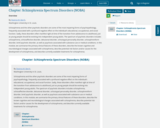
By Deanna M. Barch, Washington University in St. Louis. Schizophrenia and the other psychotic disorders are some of the most impairing forms of psychopathology, frequently associated with a profound negative effect on the individual’s educational, occupational, and social function. Sadly, these disorders often manifest right at time of the transition from adolescence to adulthood, just as young people should be evolving into independent young adults. The spectrum of psychotic disorders includes schizophrenia, schizoaffective disorder, delusional disorder, schizotypal personality disorder, schizophreniform disorder, brief psychotic disorder, as well as psychosis associated with substance use or medical conditions. In this module, we summarize the primary clinical features of these disorders, describe the known cognitive and neurobiological changes associated with schizophrenia, describe potential risk factors and/or causes for the development of schizophrenia, and describe currently available treatments for schizophrenia.
- Subject:
- Psychology
- Material Type:
- Lecture Notes
- Reading
- Author:
- Maura Krestar
- Date Added:
- 05/20/2021
